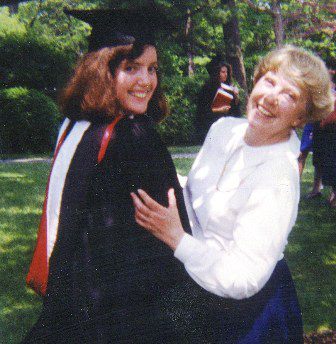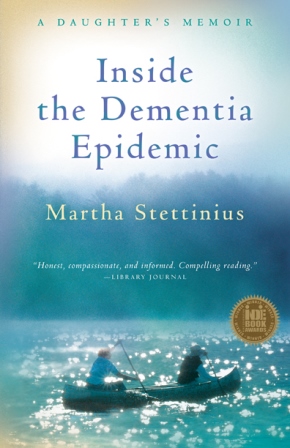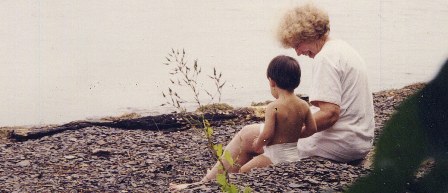Facing Mother's Day When Your Mom Has Dementia
 Tuesday, May 6, 2014 at 10:46AM
Tuesday, May 6, 2014 at 10:46AM  Mom and me at my college graduation, about 10 years before symptoms of dementia began.
Mom and me at my college graduation, about 10 years before symptoms of dementia began.
My mother, Judy, passed away a little over a year ago, but as Mother's Day approaches, I don't feel sad. I know that a lot of people do feel devastated around this time of year when their mothers are living with dementia or gone after a long decline. I don't feel sad, because I was able to enjoy many sweet, loving moments with Mom before she died, even when she was in the final stages of dementia.
I feel lucky that what I remember the most of those years are not the stresses and trauma of caregiving (and there was plenty of that) but the feeling of holding her hand, looking into her eyes, and noticing the smallest of expressions on her face. Over time, I learned that we could communicate with each other through more than words, and that she still loved me even if she was unsure at times of who I was. She knew I was very special to her, and that she was very special to me. Caregiving helped us overcome what had been a challenging mother-daughter relationship, to grow closer. When I think of Mother's Day I think of that essence of Judy, deep down inside beyond the dementia, the essence of her spirit that continued to nurture me as her daughter and her friend well into the final stages of the disease.
In honor of Mother's Day, I'd like to share a blog post here by Deborah Shouse called "Top 3 Ways to Celebrate Mother's Day When Your Mom has Alzheimer's." I love Deborah's writing (I reviewed her book "Love in the Land of Dementia" here). She acknowledges the pain of losing so much of the vital person we knew to Alzheimer's or another dementia, but she also appreciates and celebrates the ways we can still connect with their spirit in the moment.
This is the beginning of Deborah's post today on her blog "Deborah Shouse Writes." You can click below to read the rest on her blog.
“I don’t know what to do about Mother’s Day,” a friend recently told me. “I used to celebrate with my mother, but Mom doesn’t really recognize me now and the holiday won’t mean anything to her.”
My friend was not alone in her dilemma: according to the Shriver Report, ten million women either have Deborah ShouseAlzheimer’s or are caring for someone with it.
Deborah ShouseAlzheimer’s or are caring for someone with it.
I’d faced the same issue with my mom as she sank into Alzheimer’s. But I’d decided that celebrating Mother’s Day was important for me and for my family, even if Mom didn’t truly understand what was going on.
Read the rest of her blog post here.


















Reader Comments